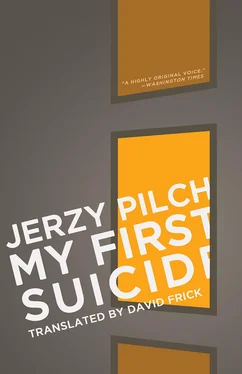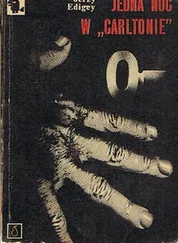Every day, after knocking off work, we would go to the local dive called Europa and one of seven indistinguishable local alcoholics would tell us the next in the series of stories about the vampire; we would each drink two beers and then go over to the Technical College building, which was beautifully situated in the depths of a park that had run wild. These expeditions were conducted in vain. Almost all the windows were closed, in spite of the September heat wave; the massive crowns of the oaks, and the equally massive clouds were reflected in the panes — and not a living soul.
Out back, on the playing field, there was no one; in the residential wing — no one; in the quite visible corridors — no one. Not a trace of a figure running by, not a shadow of shoulders, hair, feet. No billowing frock, cast off scarf, brooch, bracelet, ribbon. There was the barely perceptible scent of perfume — but even this might have been a pious wish. No song, no laughter, no giggles. Once, it seemed to us that we heard the murmur of a hair dryer; but this could just as well have been the distant drone of a biplane flying south. Other than that, neither hide nor hair. A complete void, wilderness, and, what follows from this, the complete absence of civilized customs.
It goes without saying, Poland at that time— anno Domini 1971—was under the Muscovite yoke, but regardless of the yoke, and regardless of the political system, it is accepted in all of human civilization that when, outside a woman’s boarding house, school, dormitory, workers’ hotel, convent, or even, for that matter, prison, there stands a group of starving men, and even if they are not granted entrance, they will at least receive an answer. Sooner or later, a window is cracked, and at first in the cracked window, and later in the wide open window, the boldest of the inhabitants (usually the chorus leader of middling looks) appears, and the exciting dialogue — although usually full of every sort of idiocy — begins.
“Are the gentlemen seeking something? Have they perhaps lost something?”
“We haven’t lost anything, but we are seeking.”
“If you haven’t lost anything, you can’t be seeking it.”
“We are seeking in order to find it.”
“I wonder what that could be? What do you wish to find?”
“We can’t say it out loud.”
“If you can’t say it out loud, you can’t say it at all.”
“If you can’t say it quietly, you don’t say it out loud.”
“Too bad. Either out loud, or not at all.”
“OK. In that case, we’ll say what we are seeking.”
“But we no longer care about that. We are no longer interested in what you are seeking. Seek and ye shall find. Farewell.”
“Knock, and it shall be opened unto you.”
“Well my, my! Which of you is so pious?”
“We are all pious.”
“Girls! We have a group of pilgrims under our windows!”
“Don’t ridicule our faith, sister. We have among us one who has felt the calling and intends to enter the seminary.”
“Girls! We have pilgrims under our windows! With a future clergyman!”
“Sisters! Receive the weary wayfarers under your roof!”
“We can’t today, because we already have a group of pilgrims spending the night with us. But give it a try again tomorrow. Knock, and it shall be opened unto you. But not on the first try.” Etc., etc.
Wittenberg and I were experts at such dialogues. We had tens, and perhaps hundreds of balcony scenes under our belts. We had spent tens, and perhaps hundreds of hours under the walls of castles conducting unending conversations with imprisoned virgins. We knew how to put on performances like these and how to play them out. With the virtuosity of old actors, making skillful pauses for applause, we foresaw at what moment more and more numerous giggles would begin to emerge from within, gradually turning into generalized laughter; and after which line beautiful little girls’ heads would begin to appear in the windows — at first bashfully, but then more and more boldly and en masse . It was always obvious, more or less, when other voices would join the voice of the leader of the chorus, and when we could begin to establish eye contact with the chosen beauties who would relentlessly stand in the windows. (The rule is this: you must establish eye contact with those who disappear every little bit and return after a moment; it is common knowledge that they disappear to put their hair in order, remove their glasses, throw a flattering shawl over their shoulders. This is the group from which the final recruitment will be made.) Even then we had all this knowledge at our fingertips, and every day, with dull stubbornness — like a person doggedly turning a broken television set on and off in the hope that it will repair itself — we would traipse over to the deserted Dressmakers’ Technical School, expecting that finally a window would be cracked, the saucy leader would appear, and the ritual spectacle would begin. And yet, day after day, nothing, nothing, nothing. It seemed that the Silesian vampire had indeed murdered all the girl students, or as if, in a total panic, they had all fled into the depths of the forest, into which the park was gradually being transformed.
II
Personally, I didn’t make a tragedy of the thing, nor did I even complain very much. I was madly in love. To be sure, I traipsed over to the Technical School with full conviction, and — with deep faith — I looked for a miracle. When some young lady would make an appearance in the Austro-Hungarian lanes — thereby irrefutably proving that they nonetheless are, that they live, that they exist — or rather a couple young ladies from the clothiers’ school (they always went to town in groups of no less than two), with eager enthusiasm, by myself or with our entire five-person brigade, I would set off following her, and I would attempt to strike up a conversation — masterfully, although fruitlessly. I reacted intensely to the strong bodies of the four female bricklayer’s assistants who worked with us, hidden though they were under overalls stiffened from lime. Thousands of temptations and licentious scenes swarmed in my head. The most important, however, was Gocha.
Our love had erupted in the second year of the lyceum , lasted through the third and fourth, and now, after the matura and the entrance exams (Gocha had passed the exam for the school of dentistry), it not only lasted and lasted, but it exploded more and more forcefully, with a volcanic force unknown in our latitudes. Gocha. Gocha of Gochas. Gocha like the Lausanne Lyrics ! Gocha like a flowering poem ! Gocha like the Duino Elegies ! Gocha like The Shadowy Drink ! Almost every day I wrote letters full of quotations, plagiarisms, and every sort of amatory graphomania, and every weekend I rode up into the mountains to see her. Those trips, like everything in life, required me to deceive my folks.
III
Anno Domini 1971 was the nineteenth year of my life, and, in that year, telling my forty-year-old Mother and my forty-five-year-old Father that I went to see a girl on Saturdays and Sundays was out of the question. Even worse, I had to head off an attack on their part. For a few months by that time, my folks had been in possession of the first and — as it would later turn out — only car of their lives, and there was a permanent threat that they would drop by and make an unexpected visit. My old man was the worst driver in the world, but his pathological pride wouldn’t allow him to turn the driving over to Mother, to say nothing of me. By taking thousands of additional lessons, by paying thousands of złotys extra, and by practicing changing gears for hours at a time with dry runs, he passed the driving exam with the greatest difficulty. He hated driving, and he hated the car — a Fiat 125 purchased, with difficulty, using money borrowed from Pastor Kalinowski — and, it goes without saying, he drove with heroic perserverence. Reproofs of instruction are the way of life. Every trip was an inhuman torture and humiliation. In addition, every trip had to have some definite and edifying geographical goal. The possibility that one might drive a car solely for the purpose of improving their driving technique, and without a destinational, geographical, or, best of all, geo-historical reason, didn’t come into consideration. A Lutheran — even if he is driving solely for the purpose of perfecting his driving technique — must drive somewhere . And not just somewhere , but to some fundamental, or at any rate useful, place. To drive who knows where, to take who knows what turn — this is impossible. There is no such thing as a sudden hankering for a left or a right turn. Sudden, and unfounded hankerings are beyond the Lutheran anatomy.
Читать дальше












